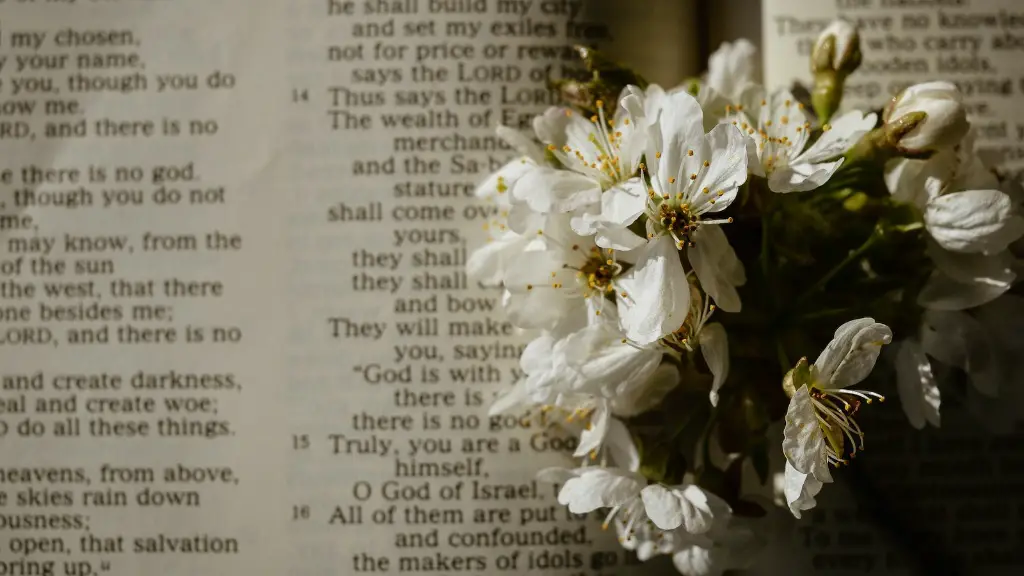Abortion is a hot topic all over the world, and is a major point of discussion and disagreement in many religions. One of the most common questions, especially in Christian circles, is whether or not the Bible mentions the topic at all. In this article we are going to delve into the scripture and find out more about the Bible’s stance on abortion.
To start, the Bible never explicitly mentions the word ‘abortion’. There have been many interpretations of the scripture, from both sides of the debate, but the Bible does not provide a definitive answer. This is a complicated discussion as the Bible does not mention modern day medical procedures, like RU-486 or a D and C, which are used for abortion today.
That being said, there are passages in the Bible that refer to the sanctity of the unborn child. In Psalm 139:13-16, we see this clearly:
For thou hast possessed my reins: thou hast covered me in my mother’s womb. I will praise thee; for I am fearfully and wonderfully made: marvellous are thy works; and that my soul knoweth right well. My substance was not hid from thee, when I was made in secret, and curiously wrought in the lowest parts of the earth. Thine eyes did see my substance, yet being unperfect; and in thy book all my members were written, which in continuance were fashioned, when as yet there was none of them.
Here, the author is talking about God’s creation of the unborn into the world and how it is a beautiful thing. This and other passages in Scripture speak to the sanctity of life, which could be interpreted as referencing abortion and the idea of taking a life.
In addition, there are some stories in the Bible that have been interpreted as referencing abortion and the idea that it is pre-meditated murder. For instance, in Numbers 5 there is a story about a wife who is suspected of adultery and is sentenced to drink a special potion made from the ashes of a heifer. The Rabbinical interpretation of this is that the early Judaic leaders saw this potion as a form of abortion, and that it was used as a punishment for infidelity.
Concealed Pregnancies & Unborn Children In The Bible
The Bible contains multiple stories of women concealing their pregnancies and unborn children. These stories could indicate that the unborn were seen as sacred and valuable even before birth. For instance, in the book of Numbers 27: 1-9, there is the story of Zelophehad, a man who died leaving five daughters. The daughters plead for their inheritance and the judges allow them to ‘inherit’ as if they were sons – indicating that unborn children were seen as valid human beings.
The Bible also contains stories like that of Moses’ mother and the Pharaoh in Exodus 2. In this story, Pharaoh commands that all the male children born to Hebrew women be killed at birth. Though this command is cruel and difficult to imagine, it further indicates the value of the unborn child in the eyes of early Judaic leaders.
What Did Jesus Say About Abortions?
Unsurprisingly, the discussion of abortion has also been seen in Jesus’ teachings. We do not know for certain what Jesus would say about abortion in the modern day, as scripture does not provide a definitive answer. Many Christian churches today have adopted a position of ‘pro-choice’, or the belief that it is up to a woman to decide whether or not she wants to have an abortion, however that is often in opposition to hardline conservative Christian groups who are firmly against abortion.
Matthew 19:14 does refer to ‘little children’ which could be interpreted as referring to unborn children, however this interpretation is open to debate. Furthermore, the Sermon on the Mount in Matthew 5:17-19 has been seen as endorsing the idea of mercy and compassion towards the vulnerable. Though the exact meaning of these passages has been open to various interpretations, many argue that Jesus’ teaching was not to endorse abortions, but instead to argue in favor of mercy, love and grace towards the downtrodden.
Expert Perspectives
In the eyes of Christian leaders, opinions on abortion differ widely. Pope Francis famously said ‘Abortion is never the answer’, yet there are others who would argue in favor of a woman’s right to choose. The Southern Baptist Convention (SBC) rejects abortion however allows for exceptions in cases of ‘rape, incest, or a clear threat to the mother’s physical life’. Ultimately, it is ultimately up to each individual Christian to make their own judgement about the matter.
In conclusion, the Bible does not explicitly mention abortion as we know it today and interpretations of scripture can vary widely. From the stories of unborn children to Jesus’ teachings on mercy and grace, the Bible does indicate that unborn life is precious and one should be considerate when making a decision of this magnitude. Ultimately, it is up to the individual Christian to make up their own mind.
Doctrine & Practices Of Different Christian Denominations
The stance on abortion differs among the different Christian denominations. For instance, the Roman Catholic Church has a firm stance against abortion, viewing it as a violation of the sixth commandment, ‘thou shalt not kill’. It is deemed as a grave offence and those who take part in it are subject to excommunication.
The Anglican Church has a more nuanced view, allowing a woman to have an abortion if she deems that it is necessary for her physical or mental health, or in cases of rape or incest. The Orthodox Church is similar in its stance, allowing for abortion in cases of rape, incest or danger to the mother’s life. Other denominations, such as the Wesleyan Church, take a much more liberal stance on abortion, recognizing that the decision is ultimately up to the individual.
The stance on abortion by different denominations also reflects the cultural context in which it is spoken about. Liberal Christian circles often speak of abortion in terms of allowing a woman to make an informed decision, whereas more conservative denominations often speak of abortion in terms of sin and consequence.
Theology Of Abortion
Theology plays a key role in discussions of abortion, as the way one views the unborn child can result in dramatically differing opinions on the matter. There are those who view the unborn as a gift from God, while there are others who view it as a cluster of cells, with no soul or spiritual power. This greatly affects the way abortion is viewed in different religious circles, with some seeing it as an immoral act, and others as a woman’s right to choose.
The role of the fetus is also a major point of debate in the abortion discourse. Some churches view the unborn child as a fully formed, viable human being, with a soul and innate value, while others view it as a mass of cells that is yet to develop into a fully formed person.
Different streams of Christianity also have different views on when the soul of the unborn child is created. For instance, some orthodox circles view the soul as being created at the moment of conception, whereas the Roman Catholic and Anglican Churches view the soul as being created at the ‘quickening’, when the fetus begins to move. This further adds to the debate about abortion as it can play a major role in informing one’s opinion.
Social & Moral Implications Of Abortion
The social and moral implications of abortion are immense and are shaping the way that we in society view the topic. There are those who view the act of abortion as a moral issue, arguing that it goes against the natural order of life, while there are others who view it as an empowerment of women’s rights, arguing that it is a woman’s right to choose.
The moral implications are not simply limited to religious circles, as different societies look at this issue differently. For instance, in the United States abortion has become a hot button political topic, with many politicians taking a stance on the issue and painting it as either immoral or empowering, according to their beliefs. The same can be said for other countries, such as the UK, Canada, and Australia.
In addition to the moral implications, there are also social implications to consider. Abortion has been seen as a form of population control in certain parts of the world and a way to manage overcrowding. It is also used as an form of gender selection in some countries, largely in India, where having a baby girl can be seen as a financial burden due to the high costs of dowry payments.
In conclusion, the social and moral implications of abortion are complex and varied. It is an issue that has been debated for centuries and will surely continue to be discussed in the coming years.





